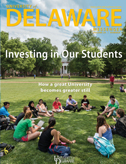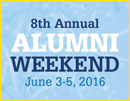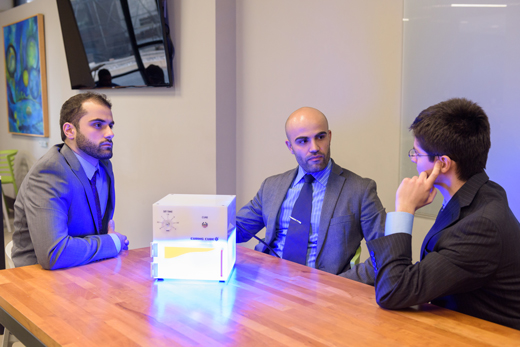
Incubating innovation
Web exclusive content on UD's entrepreneurship efforts
HATCHING NEW IDEAS, THE BLUE HEN WAY
Sometimes, all it takes is a little push to turn a great idea into a practical solution. It has been demonstrated that competitive spirit, meaningful prize money, and exposure to successful entrepreneurs and investors are just the kind of pushes that entrepreneurs need.
These are the big reasons why the Hen Hatch startup funding competition has become UD’s premier forum for showcasing promising innovations and entrepreneurial ambitions of students, faculty, alumni and staff. Sponsored by the Horn Program in Entrepreneurship, the Hen Hatch competition offers a total of $100,000 in cash and prizes to the startup projects that prevail through three rounds of judging. The 2016 Hen Hatch and Innovation Showcase features two competitive tracks, one for UD students and one for alumni, faculty and staff.
In 2015, Hen Hatch generated record 68 entries, and resulted in startup funding for such innovative ideas as SimUCare, a wearable technology developed by nursing faculty and alumni that allows nurses to perform surgical simulations on live “actors.” On the student side of the 2015 competition, the winning team earned support for their website that helps science and engineering majors master the daunting equations that can become roadblocks to early student success.
This year, 70 teams submitted applications, leading to such outside-the-box projects as solar house shingles, medical diagnostic devices and even a high-tech wallet.
For the faculty and administrators who believe that entrepreneurship education holds great potential for UD, events like Hen Hatch are about more than just giving a financial boost to promising new products and services. It’s also about supplying the motivation to dare, to dream, and to get the practical, hands-on experience that’s crucial for entrepreneurial success.
It’s also a chance to connect with real-world success stories in the field of startups and be elbow to elbow with entrepreneurs and investors. The 2016 Hen Hatch is stocked with blue ribbon panels of highly successful entrepreneurs, investors and CEO’s.
“It’s great to win the prize, but it’s but it’s also great to see the students learning and benefitting from that experience,” says Amy Cowperthwaite, the nursing professor who helped lead the multidisciplinary team that developed SimUCare. “It’s really about the synergy between the theatre students, the nursing students and the engineering students, all of them working together for one common cause.”
The 2016 finals event will be held on April 25th from 4 PM to 9 PM at the Roselle Center for the Arts.
CREATING THE NEXT GENERATION OF INNOVATORS
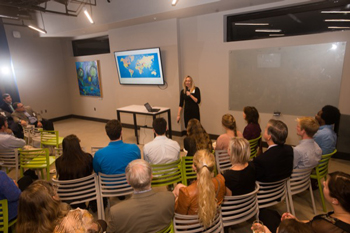
In order to make entrepreneurship an essential element of the campus experience, UD knows it must keep its focus outside the campus as well.
That’s why so many innovation and entrepreneurship-related programs include the participation of experienced businesspeople as adjuncts and mentors. And it’s also why UD is working hard to inspire and educate young students before they even enroll.
Thanks to the Paul and Linda McConnell Youth Entrepreneurship Initiative, UD is giving high school students the skills and encouragement needed to become tomorrow’s entrepreneurs, and also helping their teachers learn how to bring out that creativity.
“There are so many kids with great ideas, but the youth concept is often overlooked,” says Paul McConnell, AS74, whose gift made the initiative possible. “Most kids, given an opportunity to pursue their dreams, will amaze you with what they can do.”
The cornerstone of the initiative is the Diamond Challenge for High School Entrepreneurs, a program that brings together students from across Delaware and the world to plan a new business and put it into action. Those efforts culminate in the Youth Entrepreneurship Summit, which includes workshops featuring young entrepreneurs, an awards ceremony, networking opportunities and an expo for teachers to learn about new classroom technologies.
“It gives youth an understanding of the value of their unique approaches to solving problems,” said Julie Frieswyk, coordinator of youth and external programs for the Horn Program in Entrepreneurship, which oversees the initiative. “This is the true value of entrepreneurship—the idea that anyone can rise to the challenge of creating a great new product or solution, and in doing so take control of their own economic future.”
A CAMPUS FULL OF IDEAS
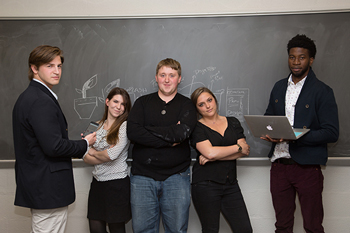
All across the UD campus, in every college and new ideas are bubbling up all the time. All across campus—in every college and from students, faculty and staff alike—UD is becoming fertile ground for new ideas to blossom and grow. Recent innovation-focused competitions have produced a rich assortment of potential products – some that have gone on to greater success, others that await their turn to become the “next big thing.”
Ultimately, success or failure of these ideas isn’t the primary point, UD believes – it’s the environment of creative energy that will ultimately make the University shine. Here’s a look at some of the born-at-UD ideas that show that energy is alive and well on campus:
CARVERTISE: A student-created company that places ads on cars, which serve as “rolling billboards.”
GOSHARE: In need of moving large objects, but don’t have access to a truck? This app connects people who have a pickup truck, van or SUV with people who need help moving, hauling, towing or shipping goods.
GEOSPOT: A location-based file sharing application with commercial and educational uses
GOHAPPY: A finalist in the 2015 Hen Hatch competition student category, this app provides real-time notifications of offers, specials and deals of local businesses.
LAZARUS RISING: A resume writing service to help homeless men and women obtain employment and transition off the streets.
LENDEDU: A student-developed online marketplace for college students to review and compare student loan refinancing options.
POCKETFARMER: Developed by an interdisciplinary team of students, this app is designed to help Christmas tree farmers in the region diagnose, identify and mark potentially diseased plants.
PROJECTEDU: Led by entrepreneurship and technology innovation student Benjamin Rapkin, AS15, and mechanical engineering student Austin Crouse, EG15, ProjectedU is a system of in-class projectors that deliver relevant content to students while they wait for instruction to begin.
QUAD CREW: A product of UD’s “Spin In” program, this is a crew-rowing boat specially designed for adults with physical disabilities.
VIBRATING THERAPEUTIC APPAREL: A business that aims to alleviate pain and improve health outcomes.
SPIN-IN
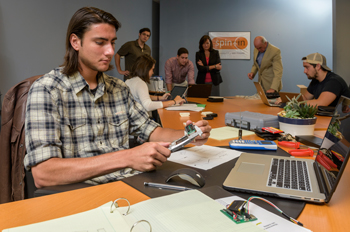
With its Spin In program, UD creates those crucial connections between ideas and the outside world.
Run by UD’s Office of Economic Innovation and Partnerships, the program pairs imaginative undergraduates with local startup businesses—giving the students a chance to channel their creative forces into real-world challenges, and giving the businesses access to new perspectives from bright young minds.
Along the way, the students get the hand-on experiences that are invaluable to developing the entrepreneur within themselves. Already, after just two years in action, Spin In has resulted in more than a dozen new products, and several of its students have gotten jobs as a result of their outside connections.
A big part of that success lies in Spin In’s inclusive approach to the students it serves. Over its first two years, 100 students from 11 departments in five colleges have participated—ensuring that projects benefit from a range of expertise and perspectives.
